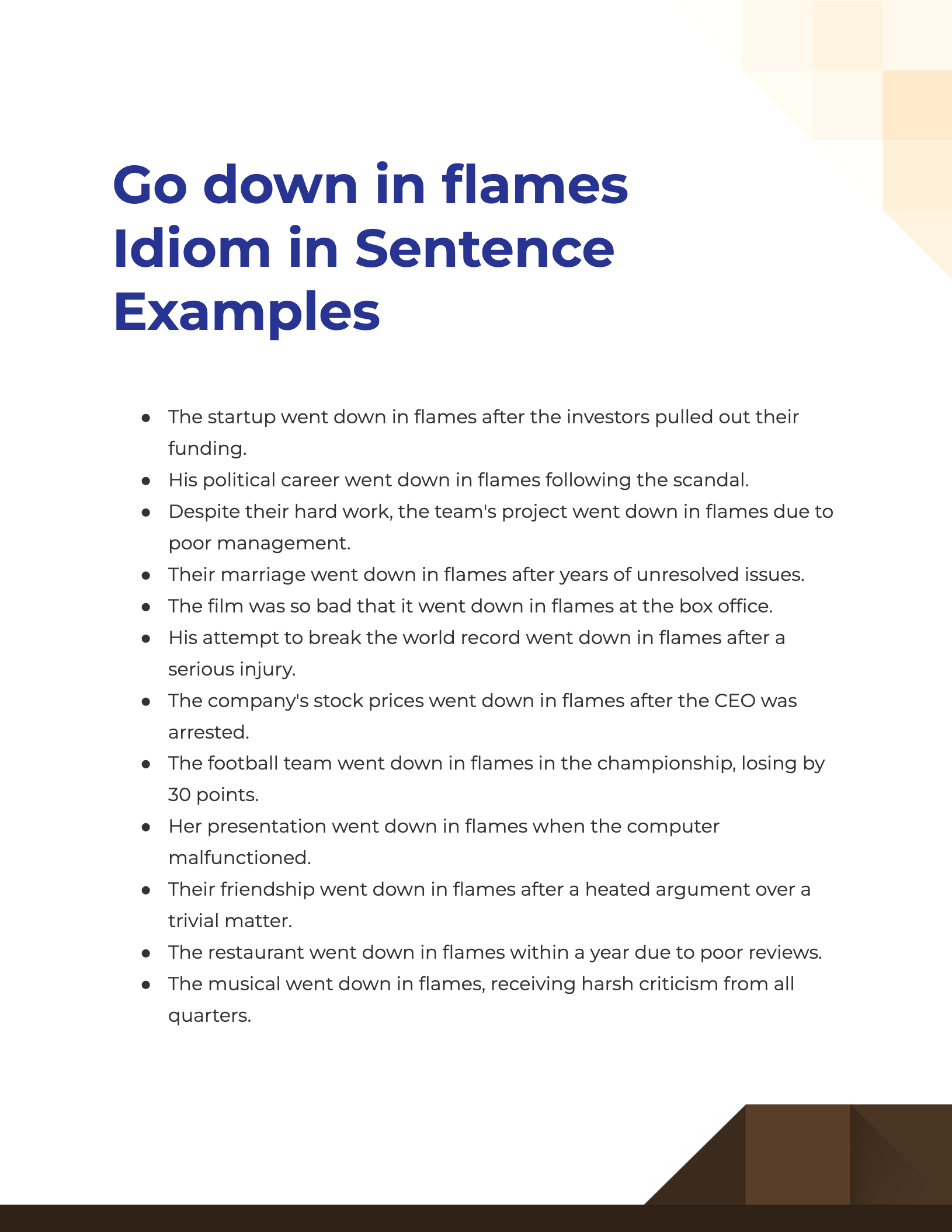19+ Go down in flames Idiom Examples
Immerse yourself in the world of idiomatic expressions with our deep-dive into the phrase “Go down in flames.” This vivid idiom often shows up in everyday conversations and popular culture, but do you know what it really means? In this comprehensive guide, we’ll unpack its origins, crystal-clear definitions, and compelling idiom examples, giving you the know-how to use it skillfully in various contexts.
What is the Go down in flames Idiom? – Definition
“Go down in flames” is an idiomatic expression used to describe a situation, project, or endeavor that ends in dramatic failure or disaster.
What is the Meaning of Go down in flames Idiom?
The idiom refers to something that not just fails, but fails spectacularly. It’s used when a situation has irreversibly turned for the worse, resulting in significant loss or embarrassment.
Origin of Go down in flames Idiom
The phrase “Go down in flames” has its roots in military aviation. During World War I and II, airplanes that were hit would often burst into flames before crashing. Over time, this literal description morphed into a metaphor for any kind of spectacular failure.
20 Best Sentence Examples with Go down in flames Idiom

- The startup went down in flames after the investors pulled out their funding.
- His political career went down in flames following the scandal.
- Despite their hard work, the team’s project went down in flames due to poor management.
- Their marriage went down in flames after years of unresolved issues.
- The film was so bad that it went down in flames at the box office.
- His attempt to break the world record went down in flames after a serious injury.
- The company’s stock prices went down in flames after the CEO was arrested.
- The football team went down in flames in the championship, losing by 30 points.
- Her presentation went down in flames when the computer malfunctioned.
- Their friendship went down in flames after a heated argument over a trivial matter.
- The restaurant went down in flames within a year due to poor reviews.
- The musical went down in flames, receiving harsh criticism from all quarters.
- His debut performance went down in flames, diminishing his chances for future roles.
- The software update went down in flames, causing more bugs than it fixed.
- The marketing campaign went down in flames, wasting millions of dollars.
- The peace talks went down in flames after neither side would compromise.
- The new policy went down in flames after widespread public protest.
- The spaceship went down in flames due to a technical malfunction during the launch.
- The university’s reputation went down in flames after allegations of misconduct surfaced.
- The athlete’s hopes for a gold medal went down in flames after he was disqualified.
More Famous Idioms with Meaning, Sentence Examples
- Play It by Ear Idiom
- In Black and White Idiom
- Crocodile Tears Idiom
- Full of Beans Idiom
- Busy as a Bee Idiom
- Snake in the Grass Idiom
- Once in a blue moon
- Break a leg Idiom
- Beat around the bush Idiom
- Bite the bullet Idiom
- Through thick and thin Idiom
- Actions speak louder than words Idiom
- Jump on the bandwagon Idiom
- Call it a day Idiom
- It takes two to tango Idiom
- A blessing in disguise Idiom
- Come rain or shine Idiom
- On cloud nine Idiom
- Better late than never Idiom
- Hit the sack Idiom
- Go the extra mile Idiom
- The Whole Nine Yards Idiom
- A penny for your thoughts Idiom
- Pull someone’s leg Idiom
- As right as rain Idiom
- Ignorance is bliss Idiom
- Throw caution to the wind Idiom
- Kick the bucket Idiom
- Take a rain check Idiom
How to Use Go down in flames Idiom in Sentences?
The idiom “go down in flames” is commonly used to describe something that fails dramatically or suffers a major defeat. The phrase suggests an end that is not just a simple failure, but a spectacular one, often involving significant loss or humiliation. Here’s how to use this idiom effectively in sentences:
When to Use
- Failure Situations: Use this idiom when describing projects, relationships, or initiatives that have failed miserably.
- Dramatic Impact: The idiom adds a sense of drama to the failure, making it seem more catastrophic or intense than a simple failure.
- Figuratively and Literally: Although commonly used in a figurative sense, it can sometimes be used literally, such as when an airplane crashes.
Structure
- Usually, it’s used in the form of “[subject] + go/goes/went + down in flames.”
Examples
- He went down in flames during the debate.
- Their plan to revamp the business went down in flames.
In Questions
- Did the project go down in flames?
In Negative Form
- The venture did not go down in flames, despite initial setbacks.
Variations
- In Passive Voice: The project was made to go down in flames by poor planning.
Tips for Using Go down in flames Idiom
Be Aware of Tone
The phrase often adds a layer of severity or intensity, so be aware that it might not be suitable for all audiences or contexts.
Use Sparingly
Because of its dramatic impact, use it sparingly. Overuse can dilute its impact and may make your language seem hyperbolic.
Keep the Audience in Mind
This idiom is well-understood in English-speaking countries, but it may need explanation for those unfamiliar with English idioms.
Match with the Context
Though versatile, the idiom is best used where its dramatic flair aligns well with the mood of the conversation or piece of writing.
Use in Different Tenses
The idiom can be adjusted for tense: “goes down in flames,” “went down in flames,” “will go down in flames,” etc., making it versatile for different situations.
By understanding the intricacies of how to use “go down in flames” in various contexts, you can enrich your vocabulary and make your communication more engaging and expressive.



